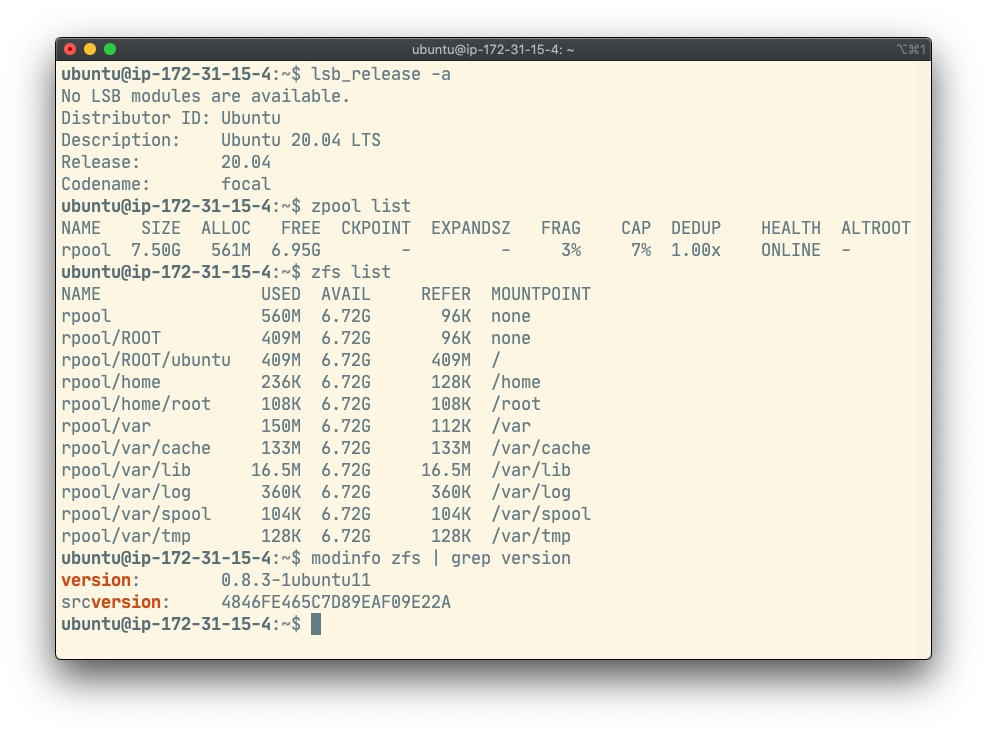It’s common in Go to have a struct that contains many pieces of state, some of which need protecting by different synchronization primitives. For example, in HashiCorp’s Raft library, the Raft structure contains several such examples:
CfgMgmtCamp 2024 Slides
During FOSDEM of 2024, mere days before the kick-off of CfgMgmtCamp 2024 in Ghent, Apple released a language named Pkl as Apache 2.0 open source.
As a heavy user of Pkl’s Apple-internal progenitor for four years at that point, I was well placed to give the first ever public talk about it, by the gracious request of the organizers - and there was no audience more suited than CfgMgmtCamp for an introduction to such a release!
[Read More]Ubuntu 20.04 With Root ZFS in AWS
For several years now, I’ve been running all my AWS instances with a recent long-term support edition of Ubuntu server,
ZFS as the root file system. Ubuntu 20.04 LTS was released today, so I’ve updated my Packer templates -
the original inspiration for the amazon-ebssurrogate builder - to support it!

Ubuntu 20.04 has some nice new features, including:
- ZFS on Linux version 0.8.3,
- Linux Kernel version 5.4, including
io_uringand built-in support for WireGuard, - Up-to-date compiler and runtime packages for a variety of platforms.
Since I last updated these templates, HashiCorp have also added a feature to Packer to allow templates to be authored in HashiCorp Configuration Language v2 instead of JSON.
[Read More]Completion of Generated Code in IntelliJ Rust
Recently, I’ve been doing a lot of work with Tonic, a Rust implementation of
the gRPC protocol. Like many implementations of gRPC, Tonic generates code from
the protocol buffers definitions at build time using the tonic-build crate in a Cargo
build script, and by default puts them in the path referred to by OUT_DIR. This has
the unfortunate side effect that tooling such as IntelliJ Rust does
not see the generated code for the purposes of analysis and completion - something very
useful for the verbose generated protocol buffers code - unless you take some additional
steps.
CfgMgmtCamp 2020 - Slides
At CfgMgmtCamp 2020, I gave a talk entitled “Terraform Without The Mess”, in which we looked at how the history of features in Terraform affect the way we structure and write our Terraform configuration today, and make opinionated recommendations about how to structure modern Terraform code in a way which makes changes simple, predictable and safe.
[Read More]Services in GitHub Actions
While the features of GitHub Actions have existed on various platforms - Travis CI, AppVeyor and more recently Azure DevOps - the overall lack of billing and user management friction combined with the ability to run workflows on Linux, macOS and Windows make Actions very compelling.
[Read More]HashiConf EU 2019 - CloudInit: The Good Parts
At the 2019 edition of HashiConf EU in Amsterdam, I gave a talk entitled “CloudInit: The Good Parts” - a surprisingly long talk given the subject matter! I’ve had a number of requests for the slide deck, which I’m posting here along with the video from the event.
[Read More]Ubuntu 18.4 With Root ZFS on AWS
Last year, I posted about how to build Ubuntu 16.04 AMIs using HashiCorp Packer’s ebs-surrogate builder. Since then Ubuntu 18.04 has been released, and the process has changed a little.
[Read More]HashiDays Amsterdam 2018 - systemd: The Good Parts
At HashiDays Amsterdam 2018, I gave a talk entitled “systemd: The Good Parts”, in which I tried to focus on how to use systemd, aimed at practitioners who are committed to a Linux distribution which uses the controversial init system.
Windows AMIs With Even Fewer Tears
Some recent image building work I was doing required images based on Windows Server. One of my more popular posts, Windows AMIs Without the Tears, detailed the fraught endeavor of making the WinRM management system work for this purpose, but since then Microsoft have substantially improved the situation by committing engineering effort to porting OpenSSH to Windows.
[Read More]